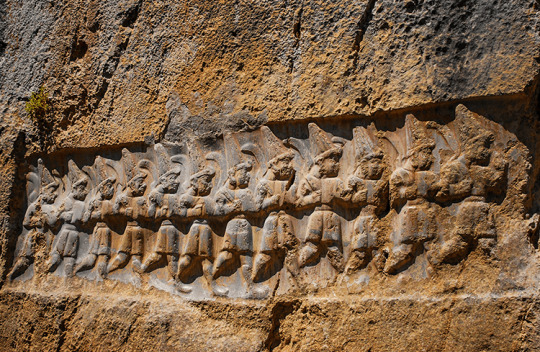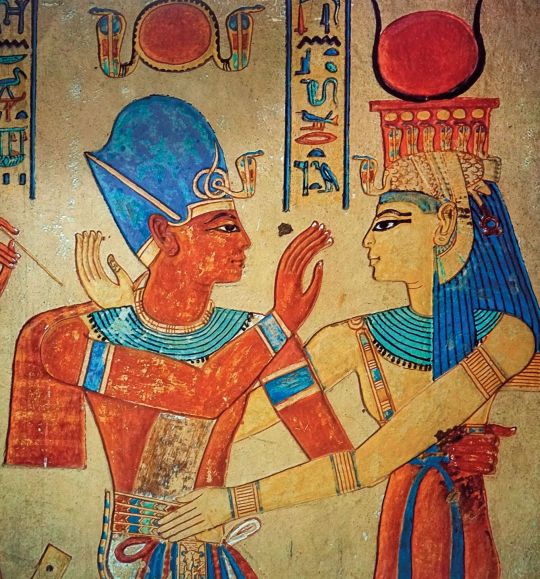#Sea Peoples
Note

thesis about the sea peoples you say? may i request an infodump about the sea peoples?
Heya!
So, basically in college (undergraduate) I got really obsessed with the questions around the Collapse of the Aegean Bronze Age, mostly because I wanted to set my big Magnum Opus historical fiction novel in that time, and the deeper I dug into the rabbit hole the more it appeared that no one, absolutely no one, actually knows why the civilizations around the Mediterranean all fell from a state of pretty sophisticated internationally-trading civilizations to literal Dark Ages (all except for Egypt which was substantially weakened and never really recovered), all at once around 1200-1100 BCE.
The Sea Peoples are the names of the only contemporary (Egyptian) account we have that names who might have been responsible if this collapse was due to an invasion. It's a popular theory because a viking-style invasion is a much sexier reason for a civilization to collapse so we all gather around it like moths to flame. But the thing is, there's a lot of contradictory evidence for and against and shading that hypothesis.
Suffice to say, literally no actually knows what happened and almost every answer comes up, "Some combination of these things, probably?"
But what makes the Collapse even more interesting from a modern perspective is that if there was a historical Trojan War (and I think there was) as fictionalized in the Iliad and the Odyssey (and Song of Achilles, for the Tumbrlistas), then it would have taken place within a generation of the entire civilization that launched the Trojan War crumbling to dust.
So like, if you're Telemachus, your dad Odysseus fights in the Trojan War, some even manage to get home, and then like... everything goes to shit. Catastrophically. And doesn't recover for 400 years.
Seriously, they lost the written word, like how to actually write things down and read them and it took 400 years to get it back. That's how fucked shit got during the Collapse of the Bronze Age.
So my thesis was asking: what if these two things were related? What if the Trojan War either led to the Collapse or it was part of the Collapse or it was a result of the Collapse? Because the timeline is so unknown and muddled that it really could be any of those and again, that's if the Trojan War isn't entirely fictional (which I don't think it is, but many academics disagree, it used to be a whole thing up until Schliemann dug it up, and many doubted it was ever a historical event even after that.)
Ok, so at the risk of writing 75 pages on this again, let me just say:
My conclusion (more of a hypothesis proposal ultimately since there are so many gaps in our knowledge) was that the Trojan War took place before the Collapse of the Bronze Age. But, it might have been launched in response to a wider breakdown in trades routes and resources, causing the Greeks to launch the campaign basically as a bid to replenish their own coffers because they were getting squeezed by what they didn't know was the first rumblings of a global domino effect.
Therefore, since taking out Troy didn't solve those larger trends and forces, they all went home and then got slammed by the REAL problem, which was all the people who had been displaced from further away by this rolling drought or invasion or whatever that was disrupting these delicate international trade routes.
But the Greeks might have been part of the Sea Peoples too! Our only record of the Sea Peoples is from the Egyptians in a highly propagandistic text which makes them sound like this big fearsome foe but that might have been because saying, "We slaughtered a bunch of desperate refugees at our border who were looking for shelter," didn't sound as cool. If the Greeks (or Achaeans or Ahhiyawa) got swept up in this slow-rolling collapse/displacement of people, then they absolutely could have been among those refugees who crashed against the shores of Egypt.
A lot of my evidence was based on looking at how Troy was sacked (it was stripped literally down the nails and there was a lot of evidence of a long-term siege, like what we read about in the Iliad) vs. how Mycenae (Agamemnon's city) or Pylos (King Nestor's city) was sacked, where they were burned and stuff was stolen but they weren't stripped, it looks more like a standard looting hit-and-run type thing. Which led me to believe that it was different turmoil that rocked Mycenae and Pylos than what led to the sacking of Troy, despite the fact these things happened within about 20 years of each other. (Helen being a made-up reason for a resource-driven war would only be the oldest trick in the book, as far as propaganda goes, after all.)
But really, the craziest detail I'll leave you with is: we just don't know! And then it gets weirder. Because the Hittites fell at the same time so the Hittites scholars say, "Nah, the Sea Peoples weren't Hittites, they were probably Greeks." And the GREEK scholars say, "It wasn't us, it was probably the Hittites or someone else. " and the EGYPTIAN scholars say, "Yeah it was someone north of Egypt, maybe the Hittites or the Greeks." and the LEVANT scholars say, "It wasn't from the Levant, we know what was going on there, it has to be from somewhere else."
Literally every single possible source of the Sea Peoples has the scholars who specialize in that location saying it's not them and it must be the guy next door.
It's maddening!
And then there's a big ol' gap around Bulgaria and the Black Sea because, oh yeah, the Soviet Union forbade archaeology in those areas to quash any local pride so those places that were behind the Iron Curtain are decades behind on scholarship that would allow them to say, "Oh hey, it was actually us! Yeah, the invaders came from Bulgaria and got pushed down by a famine." or something to that effect.
We also have some histories from the time saying that the Sons of Heracles returned not long after the Trojan War to lay Greece to waste! And it's really evocative and sounds like it fits what we've got of all these burned cities that happened right after Troy fell! Except that's in doubt now too!
The latest theory is that it was climate change that led to a massive drought. You can read about it in the latest and most popular book on the subject, 1177 BCE which I highly recommend because if it had existed when I wrote my thesis, I wouldn't have had to write it.
But I disagree with the conclusion! Or rather, I'm skeptical. Because very decade, the problems of the day have been hypothesized as being the cause of the Collapse. Like, in the 60s, there was a theory that maybe it was internal strife around a labor strike, like the French Revolution. And y'know when there's a world war, they think it's an invasion. And there was a theory that it was 'cuz of an earthquake (I think that one is nonsense, Mediterranean civilizations famously bounce back quickly from earthquakes.) And now that climate change is on our mind, I'm a little weary to see that it's the new theory because it feels way too much like we're just projecting our problems onto this giant question mark.
Was climate an aspect! I think so! I think it might have contributed to the break down in trade routes that made everyone in the Mediterranean really stressed out and hostile and warlike and led to a lot of displacement. I'm not sure if it's the only reason though and I think the book just kinda reiterates everyone else saying, "I think it was this but in the end, we just don't know, and it was probably a lot of things." which we've known for ages so it's just repeating all the same conclusions. *sigh*
... Like I said, I wrote my thesis on this so yeah, I could go on for a while lol.
#ancient history#bronze age#collapse of the bronze age#sea peoples#lots of generalizations here for brevity so don't jump down my throat if you are also familiar with this era plz
459 notes
·
View notes
Text
i learned that the Sea Peoples were a group of sea-based raiders centered around the Mediterranean who contributed to the Bronze Age Collapse by attacking many of the major empires of the time including the Egyptians and Hittites. Today few records remain about them despite their massive impact (x)

190 notes
·
View notes
Text
Source: THE FUCKING EUPHRATES RIVER!!!!
#personal stuff#dougie rambles#euphrates river#rivers#mesopotamia#bethnahrin#my poor attempt at a joke#source#bronze age#bronze age memes#bronze age collapse#sea peoples#Bronze Age shitposting#shitpost#highbrow shitposting#Tigris river#Fertile Crescent#middle east#Asia
49 notes
·
View notes
Text
The pyramids in Sicily are fascinating…but forgotten. They may help explain many mysteries and even reveal secrets of the lost Sea Peoples.
#pyramid#sicily#italy#Sea Peoples#builder#Mystery#construction#building#Tenerife#ancient#history#ancient origins
57 notes
·
View notes
Text

6 notes
·
View notes
Text
I just saw a book called Sea People with the tagline The Puzzle of Polynesia, but I read it as “Sea Peoples”, and was very confused as to how the Polynesians had attacked ancient Egypt
2 notes
·
View notes
Text
girl are you the sea peoples? because i have no idea who you ar ebut you're gonna cause me to collapse
#i am so sleep deprived why did my brain just hand me this#???#bronze age collapse#sea peoples#history#oncilla speaks#girl are you the sea peoples because you look like you're gonna have a major impact on history
4 notes
·
View notes
Text
late bronze age raider: "Sea people? Yeah, sure, I'm a sea people. I see people, i kill them!!"
2 notes
·
View notes
Photo

Something I’ve made today.
13 notes
·
View notes
Text
i love the mystery of a civilization that we only know of because they invaded so many places around the same time, also love that they are just known as sea peoples... because they attacked from the sea
2 notes
·
View notes
Text
Sea Peoples' Invasions, Egypt, the Hittite Empire, its Achaean allies, Lukka/Peleset, the Trojan War, Homer's Intentional Falsehood, and the Modern European Forgery 'Ancient Greece'
Book review of the book 'Trojan Horse of Western History' by Anatoly V. Belyakov and Oleg A. Matveyshev
Contents
Introduction
I. The civilized Oriental World & the South Balkan periphery
II. The Hittite imperial order and the disorderly barbarians of Western Anatolia, South Balkans, Crete and the Anatolian Sea
III. The Sea Peoples' invasions as a determinant historical fact and the Trojan War as a worthless falsehood
IV. What is hidden behind the false term 'Achaean World'?
V. Without an in-depth comprehension of the Egyptian, Hittite Anatolian, Canaanite and Mesopotamian civilizations, no one can possibly understand their backward periphery
VI. Why Dio Chrysostom's historical sources are trustworthy and Homer's pretenses are proven red herring
VII. The absolute denigration of the Late Antiquity Greeks by the Ancient Egyptian high priest as the destination of Human History
VIII. Dio Chrysostom's Egyptian sacerdotal interlocutor had read Ramses III's Annals
IX. The fake term 'Ancient Greece' prevents us from assessing Homer's devastating failure
X. Conclusion

Introduction
What follows is an extensive discussion of the topics presented and the approaches employed in the aforementioned, passionately and impressively elaborated book (St. Petersburg: Piter, 2015 - 256 p.: pic / ISBN 978-5-496-01658-2) that I came to know through an astute Russian friend, shrewd thinker and avid reader.
Links to the Russian and English Wikipedia do not constitute an approval of the texts of the respective entries, but are offered for those among the non-specialized readers of my book review, who wish to launch their own search, starting with the references and the bibliography available of those entries.
Throughout the present article, I use the term 'Anatolian Sea', instead of 'Aegean Sea' which is certainly a historically valid appellation and form of reference. However, the latter term is academically inaccurate. This is so because throughout the last five millennia, we have attested that civilizations, forms of spirituality, religious faiths, cultural trends, ethnic migrations, cults, esoteric beliefs, intellectual movements, artistic and aesthetic tendencies spread from Anatolia to the sea in question, and thence to the South Balkans, and not vice versa. When it comes to Anatolian Sea, which is undeniably a semi-closed sea, we observe that, although various influences and diverse ethnic groups arrived there from the South (Libya), the Southeast (Egypt and Canaan/Phoenicia), and the North (Thrace, Macedonia and the central part of the Balkan Peninsula), the local evolution, historical creativity, and their main factors and aspects depended on Anatolia.
All these scattered islands constitute therefore the Anatolian archipelago and they consist in sheer projection and prolongation of the Anatolian civilization. This was particularly ostensible whenever both lands, Anatolia and South Balkans, belonged to the same empire. Within the Eastern Roman Empire and the Ottoman Caliphate, Anatolia constituted the epicenter and the South Balkans represented a marginal circumference. All the islands in-between depended on Anatolia and never formed an entity of their own.

Download the book review as text only or as text and 130 pictures & legends:



#Sea peoples#Sea peoples' invasions#Egypt#Hittite Empire#Hittites#Lukka#Peleset#Pelasgians#Philistines#Achaeans#Mycenaean#Minoan#Crete#Homer#Ancient Greek epics#Troy#Trojan War#Oleg A. Matveyshev
3 notes
·
View notes
Photo

(via CSMFHT on Twitter)
5 notes
·
View notes
Text

Were they one people? Or were they multiple, possibly tribe based, polities with no central governing or very loose confederation?
0 notes
Text





Israel’s senseless slaughter leaves thousands of children orphaned. Palestine must be free! Don’t tire keep talking about what’s happening!
#free gaza#free gaza 🇵🇸#free palestine#free palestine 🇵🇸#from the river to the sea 🇵🇸#i stand with palestine 🇵🇸#palestine#rafah#all eyes on rafah#stop the genocide#use your voice#protest#people not numbers#stop killing children#stop israel#stop killing civilians#intifada
22K notes
·
View notes
Text
Like a stack of dominoes, large empires and small kingdoms across the Eastern Mediterranean and Near East fell within in a matter of decades during the 12th century BC. This is the shocking story of the Late Bronze Age collapse.
#Bronze Age#collapse#civilization#Sea Peoples#Ugarit#Mediterranean#Levant#Hittite#Greek#war#ancient#history#ancient origins
51 notes
·
View notes
Text
Drought, they suggest, reran the 2200 BCE scenario, setting off migrations and state failure.
"Why the West Rules – For Now: The patterns of history and what they reveal about the future" - Ian Morris
#book quote#why the west rules – for now#ian morris#nonfiction#historian#drought#suggestion#migration#state failure#sea peoples
1 note
·
View note